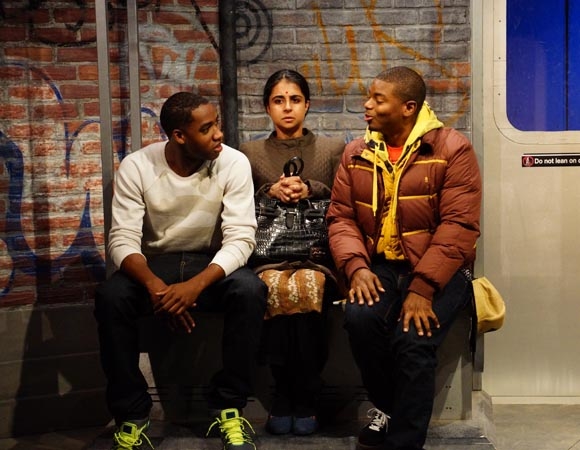When January Feels Like Summer

(© Gerry Goodstein)
Erratic winds of change are in the air during an abnormally steamy New York winter in Cori Thomas' insightful and poignant new play, When January Feels Like Summer, a coproduction by Ensemble Studio Theatre and Page 73. Common desires bind a group of five unremarkable Harlem residents, who make their way inconspicuously through the streets and subways, unaware of the stories lying dormant beneath the skin of their invisible seatmates. As they weather the volatile episodes of rain, snow, and everything in between, Thomas delicately peels back the layers of these human shells, drawing them into sharper focus while each searches for a renewed state of equilibrium.
Bringing in a buzzword from the modern zeitgeist, the irregular weather patterns are attributed to that pesky devil Global Warming. Maurice Williams and J. Mallory McCree make for an entertaining tag team as twenty-year-old Devaun and his pal Jeron, who discuss the concept in crude terms in their spare time between shifts at their respective Burger Kings. They paint stereotypical portraits of African-American urbanites while riding the subway to and from work, giddily engaging in foulmouthed banter in front of fellow passengers. Williams lends Devaun an endearing naiveté even as he misogynistically brags to his friend about his sexual conquests. Meanwhile, the short-statured McCree handily takes charge of the pair as the generally accepted sharper half of the partnership, who speaks of his ambition for a career in video game design. The duo soon stumbles upon an invigorating project that injects some meaning into their dull routine after Devaun claims to have been approached by a homosexual predator in a nearby bodega. Exposing this supposed criminal for the monster that he is becomes their life's main ambition as they see this noble mission as the key to acknowledgment and respect in a world that typically offers them neither.
In another part of town, an Indian woman Nirmala (Mahira Kakkar) runs the store her husband left to her three years ago when a shooter left him in a vegetative coma. As she struggles with the ongoing decision of whether or not to pull the plug on who we learn was a decidedly unaffectionate spouse, she simultaneously battles with her transgender brother Ishan's decision to begin his transformation into a woman he has named Indira (Debargo Sanyal) — a transformation he hopes will be facilitated by Nirmala's husband's substantial life insurance policy. Through a few twists of fate, Nirmala finds a new potential love interest in a local sanitation worker named Joe (Dion Graham), while Indira unexpectedly does as well in none other than the suave urban crime fighter Devaun.
Amid the twists, turns, and overlapping storylines, many of which, on the surface, stray into the realm of absurdity, director Daniella Topol silently keeps the characters and their unfolding circumstances grounded in a sincerity that seems as unassuming as the dingy subway doors and stocked bodega shelves that comprise Jason Simms' set. Yet, while emitting the unremarkable aura of everyday urban life, Thomas and Topol manage to look under the hood of these unassuming circumstances to reveal a nuance that is absent from the casual newsreel about a pair of local citizen heroes or the struggle with transgender identity.
Thomas is blessed with a talented cast of actors who add the necessary contours to her collection of characters who yearn to be seen by a world intent on keeping them invisible. Kakkar, who opens the play as a stern shopkeeper, drudging through life's responsibilities, chips away at Nirmala's hard exterior with a series of monologues by her husband's hospital bedside. The final pieces of armor fall to the ground in a climactic moment of catharsis, visibly lighting a long-dormant fire behind her eyes. Graham offers a sweet, subdued performance as her romantic counterpart Joe, who, while carrying his own demons, helps bring about Nirmala's spiritual rebirth.
Sanyal, however — who originated this role at Pittsburgh's City Theatre — stands out among the cast of five, delivering a heartbreaking performance as he gradually transforms from Ishan to Indira. Like the other characters with whom he shares the stage, Sanyal's character begins as a vaguely cartoonish image of his particular demographic pigeonhole, offering up the usual sound bites attributed to the transgender experience. Yet, as his long brown wig, skinny jeans, and high-heeled boots (selected by costume designer Sydney Maresca) become regular staples of his wardrobe, Indira finds an increasingly relatable and sympathetic voice. While lending the play some of its greatest moments of comic relief with his perfectly timed offhand humor, the emotional monologue she delivers while anticipating her first date with the bumbling Devaun silences any restless audience members who may have remained. As Indira poignantly verbalizes her struggle to be seen in a world intent on keeping her invisible, Sanyal succeeds in making an equally strong argument on behalf of Ensemble Studio Theatre and Page 73's future collaborations.











